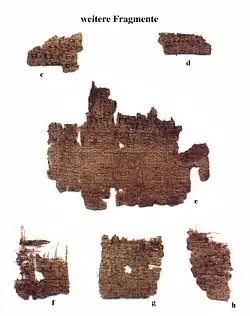Romans 6
Romans 6 is the sixth chapter of the Epistle to the Romans in the New Testament of the Christian Bible. It is authored by Paul the Apostle, while he was in Corinth in the mid 50s CE,[1] with the help of an amanuensis (secretary), Tertius, who adds his own greeting in Romans 16:22.[2] In this chapter, it is shown that the Christian, in baptism, dies to sin.[3]
| Romans 6 | |
|---|---|
 Fragments c to h containing parts of the Epistle to the Romans in Papyrus 40, written about AD 250. | |
| Book | Epistle to the Romans |
| Category | Pauline epistles |
| Christian Bible part | New Testament |
| Order in the Christian part | 6 |
Text
The original text was written in Koine Greek. This chapter is divided into 23 verses.
Textual witnesses
Some early manuscripts containing the text of this chapter are:
- Papyrus 40 (~AD 250; extant verses 4–5, 16)
- Codex Vaticanus (325–350)
- Codex Sinaiticus (330–360)
- Codex Alexandrinus (400–440)
- Codex Ephraemi Rescriptus (~450; complete)
- Papyrus 94 (5th/6th century; extant verses 10–13, 19–22)
New Testament references
The Bearing of Justification by Grace upon a Holy Life
From the beginning of this chapter, Paul addresses the 'plausible objection' [4] that Christians should "continue in sin, that grace may abound" (Romans 6:1). In Romans 3:8, Paul had referred to slanderous reports to the effect that believers taught "Let us do evil that good may come". Similar indications can be found in Galatians 5:13, 1 Peter 2:16 and Jude 4.
Paul replies that believers should "certainly not (Greek: μη γενοιτο, mē genoito) continue in sin, that grace may abound" (Romans 6:2). The phrase μη γενοιτο is regularly used by Paul; it is used 10 times in this epistle as well as in his other writings.[5] The Pulpit Commentary describes the phrase as "Paul's usual way of rejecting an idea indignantly".[6] The phrase has been translated in various forms:
- God forbid (Wycliffe Bible, King James Version and 1599 Geneva Bible)
- By no means (New International Version)
- Of course not (New Living Translation)
- Absolutely not (Holman Christian Standard Bible)
- That's unthinkable (God's Word Translation)
- Far be the thought (Darby Bible Translation)
- Let the thought be abhorred (Matthew Henry's Commentary) [7]
- I should hope not! (The Message)
Verse 4
Verse 23
See also
- Baptism
- Related Bible parts: Matthew 28
References
- Hill 2007, p. 1084.
- Donaldson, Terence L. (2007). "63. Introduction to the Pauline Corpus". In Barton, John; Muddiman, John (eds.). The Oxford Bible Commentary (first (paperback) ed.). Oxford University Press. p. 1077. ISBN 978-0199277186.
- Expositor's Greek Testament on Romans 6, accessed 12 September 2016
- Jamieson-Fausset-Brown Bible Commentary on Romans 6, accessed 12 September 2016
- Englishman's Concordance: γένοιτό (genoito), accessed 14 September 2016
- Pulpit Commentary on Romans 6, accessed 14 September 2016
- Matthew Henry's Commentary on Romans 6, accessed 14 September 2016
- Romans 6:4
- Romans 6:23
Bibliography
- Coogan, Michael David (2007). Coogan, Michael David; Brettler, Marc Zvi; Newsom, Carol Ann; Perkins, Pheme (eds.). The New Oxford Annotated Bible with the Apocryphal/Deuterocanonical Books: New Revised Standard Version, Issue 48 (Augmented 3rd ed.). Oxford University Press. ISBN 9780195288810.
- Hill, Craig C. (2007). "64. Romans". In Barton, John; Muddiman, John (eds.). The Oxford Bible Commentary (first (paperback) ed.). Oxford University Press. pp. 1083–1108. ISBN 978-0199277186. Retrieved February 6, 2019.
External links
- Romans 6 King James Bible - Wikisource
- English Translation with Parallel Latin Vulgate
- Online Bible at GospelHall.org (ESV, KJV, Darby, American Standard Version, Bible in Basic English)
- Multiple bible versions at Bible Gateway (NKJV, NIV, NRSV etc.)
